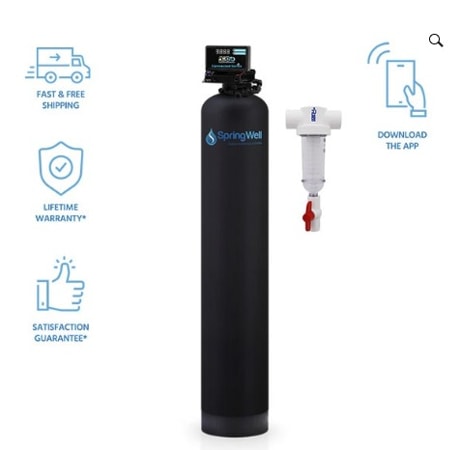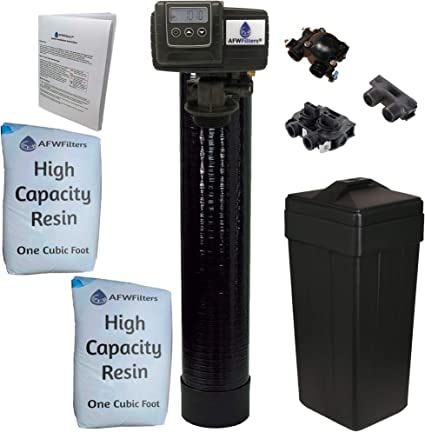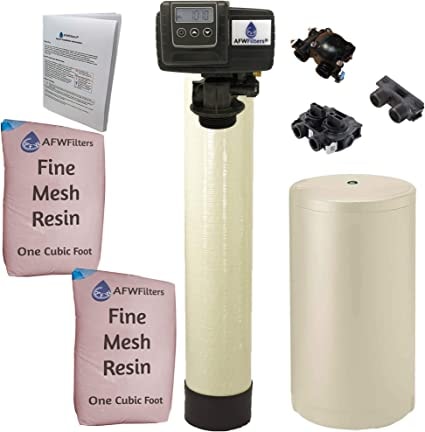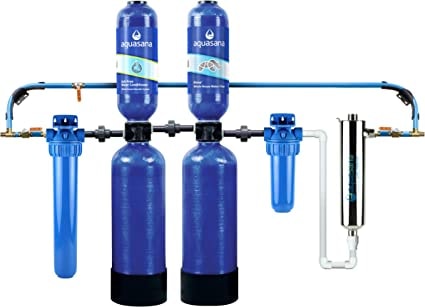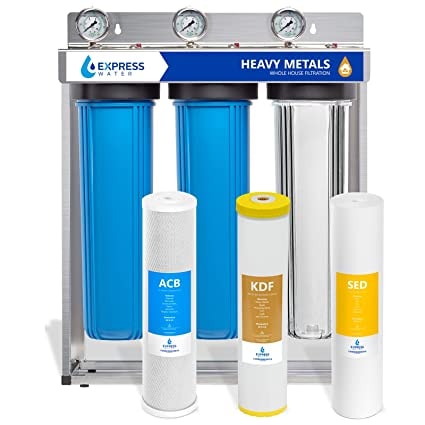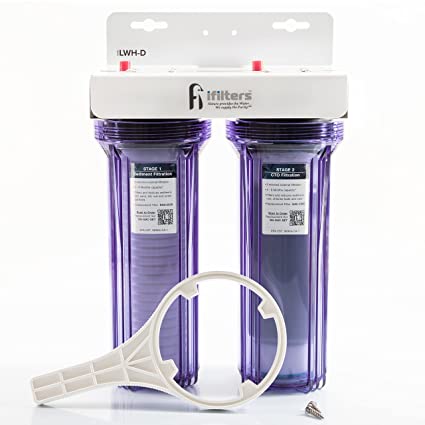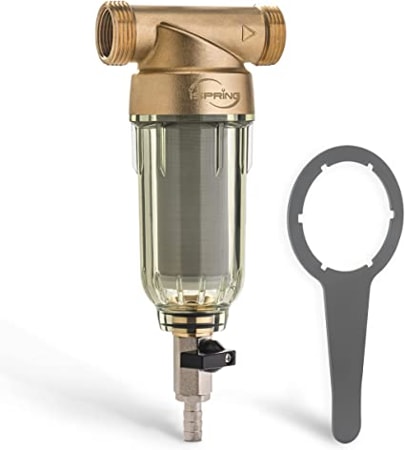Well water is generally considered safe and healthy because of natural sand filtration. However, all wells are not the same, and you would have to install a whole house water filter for well water to make your well water usable.
A whole house filtration unit filters all water entering your home. You get filtered water for appliances, toilets, kitchen faucets, showers, and bathtubs. The improved water quality is good for drinking and your home’s plumbing and appliances.
Picking the right whole house filter for your home isn’t a tough call if you know what contaminants are in your well water. However, due to the tons of available options on the market, an average homeowner will get confused. This is why we have researched a few filters and reviewed the top 8 whole house water filters for well water.
Our Top Picks
- Best Overall: SpringWell Whole House Well Water Filter System [Click to Get Up to 48% Factory Discount]
- Best Whole House Water Softener: AFWFIlters Whole House Water Softener System
- Best Whole House Filter for Hard Water with Iron: AFWFilters Iron Pro 2 Combination Iron Filter & Water Softener
- Best for Hard Water and Microorganisms: Aquasana EQ-1000-AST-UV-AMZN Whole House System
- Best for Well Water with High Iron and Sulfur Concentration: Durawater Air Injection Iron Eater Filter
- Best Whole House Well Water Filter for Small Homes: Express Water 3 Stage Whole House Water Filtration System
- Best 2-Stage Whole House Water Filter for Well Water: iFilters Whole House Water Filter
- Best Whole House Sediment Filter for Well Water: iSpring WSP-50 Reusable Whole House Spin Down Sediment Water Filter
Let’s compare all these whole house water filters for well water
Filter | Image | Filter Type | Capacity | Filter Life | Flow Rate | Price |
SpringWell Whole House Well Water Filter System | Cartridge based | Iron: 7 PPM, hydrogen sulfide: 8 PPM, manganese: 1 PPM | 15-20 years | 12 GPM, 20 GPM | ||
AFWFIlters Whole House Water Softener System | Whole house water softener | 64,000 grains | - | 15 GPM | ||
AFWFilters Iron Pro 2 Combination Iron Filter & Water Softener | Whole house water softener & iron filter | 64,000 grains, iron: 6 PPM, manganese: 6 PPM | - | - | ||
Aquasana EQ-1000-AST-UV-AMZN Whole House System | Whole house salt-free softener & UV filter | - | 10 years | 7 GPM | ||
Durawater Air Injection Iron Eater Filter | Whole house iron and sulfur filter | Iron: 12 PPM, sulfur: 10 PPM, manganese: 2 PPM | - | - |
Do you know what’s important before picking a water filter? Check out these important factors:
More than one Filter for Purification
You must not buy a well water filter before testing your water. A water quality test identifies all the contaminants in water and helps select the filter as per your filtration needs. Since most whole house filters come upwards of $500, it is wise to get your water tested and select an appropriate filtration system.
This way, you can install a specialist filter to remove a particular contaminant with a certain concentration. For example, many well water filters can remove iron, but only a few can remove iron above 6 PPM. Similarly, you can check this for all contaminants.
Depending on water quality, you may also need to install more than one filter. Most people go for a sediment filter, a water softener, and a whole house filter (based on contaminants).
Filter Type
The next important thing to consider is the filter type. You can select one from cartridge-based filters (one or multiple), water softeners, iron filters, sediment filters, and UV filters. Each filter works differently and removes a particular set of contaminants.
Filter Life
Filter life means the time before you need to replace the cartridges. Some will need replacement every 2-3 months, some require replacement every 4-6 months, and some have a life of 9-12 months. Some high-quality whole house water filters for well water could last for 5-10 years.
Some manufacturers also express filter life in gallons. This helps you calculate a filter’s life based on your daily consumption.
The important thing to consider here is that these are estimated values. The actual life of a filter depends on water quality and usage.
Flow Rate
Flow rate means how much water can be used at one time or the speed at which water leaves your filter. This is important as a slow flow rate can frustrate you with low-pressure water.
Whole house well water filters have a flow rate between 7-25 gallons per minute. An average home with 2-3 bathrooms and 4-5 people needs a 10-20 GPM flow rate. Some people like fast water from taps and prefer filters with a fast flow rate.
Also Read: The 6 Best Water Filter Pitchers For Well Water
Installation & Maintenance
Some whole house water filters are easier to install compared to others. You have to cut the main water pipe, connect the filter and then connect the main water pipe to the other side. Most filters can be DIY installed if you know how plumbing connections work.
Some complex units require multiple valve installation, pressure buttons, and drain valves. We recommend you hire a professional plumber to install such filters.
All water filters require periodic maintenance. You’ll have to notice leaks, keep the filter clean and replace cartridges according to your system’s lifespan. Make sure you get a unit that has easy and convenient filtration.
Cost
Cost is a two-dimensional factor for water filters. You’ll have to pay the upfront price and then buy replacement cartridges periodically. So don’t forget to check replacement costs before buying a water filter.
Extra Features
Some whole house filters have extra features like filter replacement reminders, pressure gauges, pressure relief buttons, and bypass valves. These features don’t enhance the filtration capabilities of your filter, but they make the system user-friendly.
Warranty and Certifications
Warranty and certifications add value to your purchase. These features show that the manufacturer is confident about its product and gets it tested by third-party organizations to ensure that it works optimally under pressure and in the long run.
Review of Our Top Picks
1. Best Overall: SpringWell Whole House Well Water Filter System
Features
- Filter Type: Cartridge based
- Flow Rate: 12 GPM, 20 GPM
- Filter Life: 15-20 years
- Warranty: Lifetime
SpringWell’s whole house well water filter is rated the best because it offers the best value for money and top-notch filtration capabilities. The system reviewed here is the base model that can remove iron (7 PPM), hydrogen sulfide (8 PPM), and manganese (1 PPM). You can upgrade the system to a UV purification system, RO filter, and salt-based water softener.
The system uses air injection oxidation to remove these contaminants. It backwashes to refresh the air pocket, remove accumulated contaminants and replenish the filter media bed. It is a septic-safe filter, so you don’t need to worry about your septic tank’s health and functioning.
All the components used in the making are certified, so no harmful contaminants are added to the water during the filtration process. The unit comes in two variants; one with a 12 GPM flow rate and one with 20 GPM for large homes with 4+ bathrooms. Customers mention that the flow rate doesn’t decrease even when all the taps run simultaneously.
The installation process is quite straightforward. SpringWell suggests a DIY installation only if you are handy with plumbing and piping. All tools required for installation are included in the box. An electronic head controls the unit for setting backwash time.
The user feedback is excellent. Users mention that pre and post-installation water tests reveal a significant improvement in water quality. The system is so effective that you can notice better quality water even without testing the water.
Pros
- Excellent flow rate
- Improves water taste
- Durable and solid construction
Cons
- Costly
- Plastic fittings
2. Best Whole House Water Softener: AFWFIlters Whole House Water Softener System
Features
- Filter Type: Whole house water softener
- Filtration Capacity: 64,000 grains
- Flow Rate: 15 GPM
- Warranty: Tank: 10 years, control head: 5 years
Well water becomes hard as it moves underground and takes up calcium and magnesium. Some private well owners have reported that hardness is the only problem with their well water. If this is the case with your well water, there is no point in installing water filters to reduce the flow rate.
This water softener from AFWFilters with a Fleck 5600SX control head is ideal for small to large homes with severe hard water problems. The softener has a maximum capacity of 64,000 grains. It can remove high concentrations of calcium and magnesium up to 180 mg/L.
The system uses 2 cubic foot high capacity resin for replacing calcium and magnesium with sodium or potassium in your well water. This process is known as the ion-exchange process.
The unit comes with pre-loaded resin for easy installation. A brine tank is also included for easy brine replacement. Overall, it is a high-quality water softener that will make your water soft without much hassle. It is easy to install and maintain.
Buyers express utmost satisfaction and recommend this softener for private well owners worried about removing hardness in water. Some users mentioned that resin came in separate boxes. They had to buy funnels to load the resin, which increased installation time.
Pros
- Easy installation
- Bypass valve included
- Fit for extremely hard water
Cons
- A bit pricey
3. Best Whole House Filter for Hard Water with Iron: AFWFilters Iron Pro 2 Combination Iron Filter & Water Softener
Features
- Filter Type: Whole house water softener & iron filter
- Filtration Capacity: 64,000 grains, iron: 6 PPM, manganese: 6 PPM
- Warranty: Tank: 10 years, control head: 5 years
Iron and manganese often tag along with hardness in well water. If the water quality tests reveal that these elements are iron and manganese in your water are up to 6 PPM, this filter is best for you. The unit can soften water, reduce iron and manganese, and remove sediment from well water.
This filter runs two mechanisms at one time. The ion-exchange process makes water soft, and the air pocket oxidizes water to remove iron and manganese. The filter is backwashed to remove the accumulated contaminants and replenish the filtration media.
The box includes a bypass tank, a control head valve, a discharge drain, and instructions for DIY installation. You can program the control head for metered regeneration. The system will only regenerate when it can’t perform effectively. This results in water conservation.
The unit delivers a decent flow rate because of 1-inch connections. Moreover, it has a large grain capacity, so you can easily use it for 5-6 people with a weekly regeneration routine.
User feedback puts this unit above other water softeners. People mention that scale had disappeared and appliances give better performance after installing this unit. On the flip side, many buyers mention this system is just an average water softener that doesn’t remove iron from well water.
Pros
- Excellent flow rate
- Easy installation
- Metered backwash
Cons
- Doesn’t iron above 6 PPM
4. Best for Hard Water and Microorganisms: Aquasana EQ-1000-AST-UV-AMZN Whole House System
Features
- Filter Type: Whole house salt-free softener & UV filter
- Flow Rate: 7 GPM
- Filter Life: 10 years
- Warranty: 10 years
Aquasana is known for making high-quality whole house well water filtration systems. This unit from Aquasana is a multi-stage water filtration system that delivers high-quality drinkable water.
The only problem with this filter is a slow flow rate. The maximum flow rate it generates with optimum incoming water pressure is 7 GPM. Hence, it is only suitable for small homes with 1-2 bathrooms and 3-4 residents.
The system removes sediment, heavy metals, chlorine taste & smell, viruses, bacteria, herbicides, pesticides, VOCs, and all other contaminants from water apart from TDS.
The most attractive thing about this filter is that it lasts 1 million gallons or roughly 10 years making it a maintenance-free system. You don’t need to add softening salt or replace filtration media. All you have to do is replace the pre and post filters every 2 months.
Everything required to complete the installation is included in the box. It has separate valves for each system, so you can close one part of the system and use the other.
There are mixed reviews on this filter. Most users recommend a professional installation because of its size and complex connections. Another useful tip buyers give is using 1-inch connections instead of ¾-inch included pipes. This swap helps in increasing the flow rate up to 10 GPM.
Pros
- Good for drinking water
- Salt-free water softening
- UV kills microorganisms
Cons
- Slow flow rate
- Expensive
- Doesn’t remove TDS
5. Best for Well Water with High Iron and Sulfur Concentration: Durawater Air Injection Iron Eater Filter
Features
- Filter Type: Whole house iron and sulfur filter
- Filtration Capacity: Iron: 12 PPM, sulfur: 10 PPM, manganese: 2 PPM
Some water wells have an extremely high iron concentration that an ordinary water filter cannot remove. Durawater’s air injection iron filter has been built for such wells. It can remove iron up to 12 PPM, sulfur up to 10 PPM, and manganese up to 2 PPM.
The only problem with this filter is that you will still need a water filter to remove other contaminants from well water.
The filter uses air injection to oxidize iron and sulfur for optimal filtration. The accumulated contaminants are backwashed to replenish the filter media. You can control the backwash process through the control head.
The resin comes pre-loaded for quick installation. Moreover, all things required for installation are shipped with the filter.
Users term this filter a lifesaver because it saved them from relocating or abandoning the well due to high iron concentration and stubborn stains. We recommend that you get your well water tested before buying this filter, as there is no point in using a filter that is more powerful than your need.
Pros
- Most powerful iron filter
- Easy installation
- Long-lasting
Cons
- Costly
6. Best Whole House Well Water Filter for Small Homes: Express Water 3 Stage Whole House Water Filtration System
Features
- Filter Type: 3-stage whole house
- Flow Rate: 15 GPM
- Filter Life: 6-12 months (100,000 gallons)
- Warranty: 1-year
It isn’t a good idea to buy a costly filter for small homes. This filter is also best for forest and lake cabins on well water.
This unit consists of 3 stages to purify well water for your home. The first stage is a sediment filter that removes silt, sand, dust, dirt, and rust particles from water. The next stage is the kinetic degradation fluxion (KDF) filter that removes heavy metals, algae, microorganisms, iron, lead, and chlorine. The last filter is an activated carbon block (ACB) filter that improves the taste of water, removes unnatural odors, and filters VOCs.
The maximum flow rate is 15 gallons per minute. The filter is suitable for a home with a maximum of 3 bathrooms and 4-5 inhabitants. The filter comes with 1-inch connections that help maintain a constant flow rate under duress.
Each filter is good for 100,000 gallons or 6-9 months of use for an average American family. Please note that the filter life may vary depending on incoming water quality and your usage.
The overall rating for this filter is positive. Buyers praise the individual pressure gauges and pressure relief buttons on each cartridge. These features help in maintenance. Users also mention sturdy brackets and good built quality.
Pros
- Healthy & clean water
- Constant water pressure
- Easy installation & maintenance
- Powerful sediment filtration
Cons
- Costly ongoing filter replacement
7. Best 2-Stage Whole House Water Filter for Well Water: iFilters Whole House Water Filter
Features
- Filter Type: 2-stage whole house
- Flow Rate: 3 GPM
- Filter Life: 4-6 months
- Warranty: 1 year
iFilters 2-stage whole house water filter is recommended for small homes in a community using private well water. It has a flow rate of 3 GPM, meaning it can supply water for a maximum of 1-2 bathrooms.
The first stage is a sediment filter with a 5-micron rating that can reduce dirt, sand, silt, and rust. The 2nd filter is a carbon filter reduces chlorine (taste and odor), heavy metals, and VOCs from well water. The main reason behind a slow flow rate is its small micron rating. The smaller the micron rating of a filter, the more time it takes to filter water.
The filter is easy to install. It comes with a sturdy mounting bracket, a housing wrench, and pipe connectors for installation.
Users like this system for its heavy-duty construction. It takes a couple of hours to install and doesn’t require frequent checkups for leaks. The housings are transparent, so you know when to change the filter.
Pros
- Budget pick
- Effective sediment filtration
- Transparent housing
Cons
- Slow flow rate
- Limited filtration capacity
8. Best Whole House Sediment Filter for Well Water: iSpring WSP-50 Reusable Whole House Spin Down Sediment Water Filter
Features
- Filter Type: Whole house sediment filter
- Flow Rate: 20 GPM
- Filter Life: 12-24 months
- Warranty: 1-year
Many private well owners prefer installing a separate whole house sediment filter before the pressure tank and/or before the main filtration system. This helps extend the life of subsequent filters or water tanks.
iSpring’s WSP-50 is a spin-down sediment filter best for small and medium homes. The maximum flow rate this unit can generate is 20 gallons per minute. You can run 3-4 bathrooms on this unit without pressure drops.
The filter has a 50-micron rating. It can filter particles as large as dust and debris and as small as human hair. Overall, it will increase the effectiveness of your main water filter.
The best thing about spin-down filters is their long life. You can open the flush valve to refresh the filter mesh and wash out the accumulated particles. The stated life of this filter is 1-2 years, but the actual life may change depending on water quality and usage.
The openings on both ends are 1-inch MNPT and 3/4-inch FNPT. The flush-out valve can be connected to a standard garden hose for mess-free flushing. The unit is easy to install, and you can opt for a DIY installation if you know how plumbing connections work.
Many users prefer this filter because it is a simple unit. It doesn’t need much maintenance, has an affordable price point, and works well. Customers report no leaks and installation problems.
Pros
- Decent flow rate
- Transparent housing
- Affordable price point
- Sturdy flush-out valve
Cons
- Micron rating is too big for small particles
Frequently Asked Questions
1. Is a whole house well water filter worth it?
Yes. Whole house water filtration systems filter water at the point when it enters your home. It ensures that all your taps, appliances, and plumbing fixtures receive filtered water. This helps extend the appliances’ life and keep them scale-free. Moreover, whole house filters also make water fit for drinking.
2. Where should I install a whole house water filter for well water?
A whole house water filter must be installed where water enters your home. It is typically installed after a sediment filter and before the point where water lines divide.
3. Can a whole house water filter make water soft?
Not all water filters make water soft. Some water filters come with a built-in water softener that conditions well water. A few water softeners can remove iron and manganese from well water.
4. How can I maintain a whole house water filtration system?
Each unit has different maintenance needs. The typical maintenance needs include filter replacement, checking for leaks, and ensuring that filters stay away from direct sunlight and rain.
5. Can a whole house water filter remove water minerals and TDS?
Most whole house water filters don’t remove minerals and TDS. Water minerals such as calcium and magnesium are removed using a water softener, while a reverse osmosis system removes TDS.
6. Can I install a reverse osmosis water filter for the whole house?
Yes, you can, but these units are big, costly, and difficult to maintain. RO systems are more suited for point-of-use applications such as kitchen sink.
